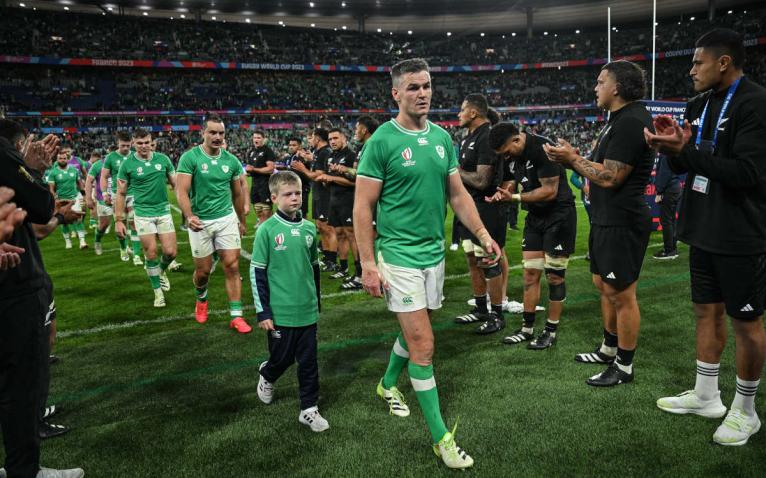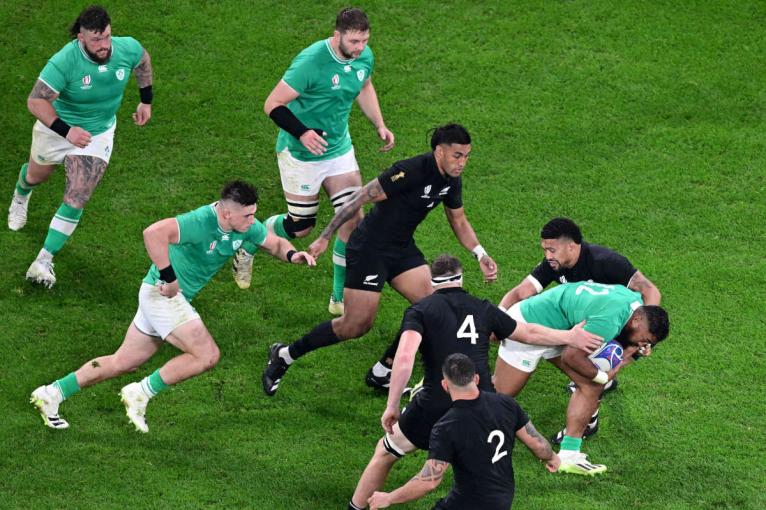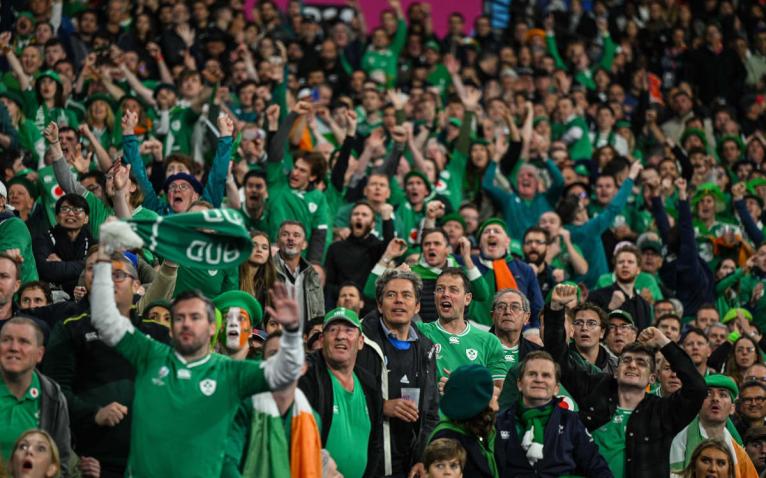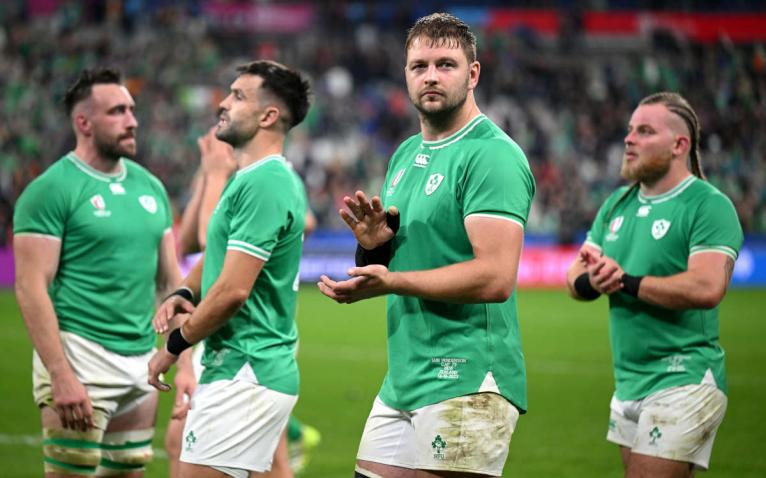The wait goes on. The weight gets heavier.
This was meant to be the day when purgatory ended, when Ireland finally won a game of knockout rugby, when the ghosts of Sydney 1987, Dublin ‘91, Durban ‘95, Lens ‘99, Melbourne ‘03, Wellington ‘11, Cardiff ‘15 and Tokyo four years ago were laid to rest.
Instead it was a reminder that fairy-tales rarely happen in sport, that even the greats don’t go out on their own terms.
Instead as night fell in Paris, the curtain came down on Johnny Sexton. He said goodbye from the stage of his greatest triumph, the Stade de France, where he scored a dramatic drop-goal in 2018 to guide Ireland to victory and launch a bid for a Grand Slam.
He’d win another of those before he called it a day and more than that, he won his way into the hearts of the Irish public, something no one would have predicted at the mid-point of his career when his feistiness rubbed people up the wrong way.
Way back then absolutely no one would have considered Sexton capable of becoming the greatest rugby player in Irish history. They’d have been armed with a highlights reel of Brian O’Driscoll’s dancing feet and boy-next door smile. How could Sexton’s Roy Keane-like snarls and a laboured running style compare to that?
Well, here’s how. O’Driscoll won three Heineken Cups. Sexton won four.
Six Nations titles? For O’Driscoll there were two, including a grand slam. Sexton won four, including two slams.

That was New Zealand, against whom it all ended last night. But even here there was joy. Whereas O’Driscoll played and lost all 13 times to the All Blacks, under Sexton’s guidance, Ireland have won five of their last nine meetings with New Zealand.
But the two that mattered most, the 2019 and 2023 World Cup quarter-finals, he lost.
Two things need to be said here. First that Irish rugby has become so much better than it was, achieving one milestone after the next this century, a first win over France in Paris in 28 years (2000), a first win over Australia in 23 years (2002), first win over South Africa in 39 years (2004), first Grand Slam in 61 years (2009), first away win over the Springboks (2016), first victory over the All Blacks (2016), first series win in New Zealand (2022).
We haven’t even mentioned the other things, the Grand Slams of 2018 and 2023 or the consistent success (seven Heineken Cups, 14 URC/Celtic League titles) of the provinces. Look at where Argentinean, Scottish and Welsh club rugby is now compared to Ireland. Look at their honours board over the last 23 years and ask yourself, who has the better system?
So let’s not berate this Irish team for falling short against a marginally more impressive outfit. Let’s call it for what it was, a classic encounter between two exceptional teams.
It’s Ireland.
But the second pertinent point to make is that Ireland has never done what those three countries have managed: namely to win a World Cup quarter-final.
That remains an embarrassment.
One day the mortification will end. A weaker and less well prepared Irish side than this will get an easier quarter-final opponent and reach the last four.
So let’s not berate this Irish team for falling short against a marginally more impressive outfit.
Let’s call it for what it was, a classic encounter between two exceptional teams.

That New Zealand found a way to seal the deal is a legacy of history, reminding you of that famous Gary Lineker quote about the England/Germany rivalry: “Football is a game of two halves, involving 22 players, lasting 90 minutes. At the end, Germany win.”
Those of us of a certain age, though, have a different interpretation of what winning is.
That story has been well documented.
But it is not the only one of its kind.
In the 1980s, Edinburgh Rugby Club also refused to travel to Belfast for a scheduled game against Ulster, a result of terrorist threats.
There and then Ulster, and Irish, rugby was at a crossroads. If a trend was set of teams staying away during this period of political turmoil, the whole fabric of Irish rugby would have been torn apart.
So, the greatest moment for players like Trevor Ringland wasn’t the day Ulster defeated the touring Wallabies side; it wasn’t even when he played for the Lions or when he won the Triple Crown in 1982 or 1985. It was when South of Scotland agreed to come to Belfast a week after Edinburgh had opted not to. “That John Jeffrey and his South of Scotland boys came anyway was just inspiring to me,” says Ringland. “The night of the game there was a bomb scare in the hotel where we were drinking. The bar emptied. But Jeffrey and his pals were the last to leave, carrying their pints with them.”

In many ways that was Irish rugby’s biggest win, the maintenance of normality. At the height of The Troubles, anyone could go and watch a game of rugby on a Saturday afternoon. Sure, there’d be helicopters overhead and you’d encounter armoured cars en route to the stadium. But inside the gates, Ravenhill was no different to Thomond Park or anywhere else.
The country was divided by a border, as well as by other things: bitterness, political viewpoints, religion. Rugby was a unifier, where Protestant and Catholic, unionist and nationalist, played on the one pitch.
In the 1980s, Ulster players kept crossing the Irish border to represent Ireland even though their lives were at risk, especially serving policemen like prop Jimmy McCoy and British Army soldier, Brian McCall. Players who had wildly different political views to them not only welcomed McCoy and McCall into the Irish side but also kept their professions a secret, keeping them safe.
People now need to realise what that Ireland team achieved in the 1980s and it can’t just be measured in trophies or ticks in a win/loss column. That side represented the best of us, carrying our hopes, shouldering our dreams.
Is winning solely about who advances to a semi-final? Not for some of us. Instead the sight of Ulstermen, Iain Henderson and Stuart McCloskey, comforting the retiring Leinsterman Sexton and Munsterman Keith Earls was indicative of something deeper and more special.
Not just that, they kept Irish rugby united.
So, yes, Ireland’s displays in subsequent World Cups have been underwhelming, just as this one has turned out to be unimpressive.
Yes, Conor Murray could have shown better discipline to avoid the concession of a needless penalty with a quarter of the game remaining; yes, the line-out could have functioned a lot more efficiently. Yes, the team could have played much, much better than they did.

But is winning solely about who advances to a semi-final? Not for some of us. Instead the sight of Ulstermen, Iain Henderson and Stuart McCloskey, comforting the retiring Leinsterman Sexton and Munsterman Keith Earls was indicative of something deeper and more special. Irish rugby has given us plenty to cheer in the last 25 years. But in the quarter of a century before that, it gave us something even more precious: the ability to feel normal. That’s what true success is. The numbers attached to two teams after 80 minutes of a rugby game, even one as seismically important as a World Cup quarter final, that’s just a scoreline.
So we move on to 2027 when an Ireland team will once again compete. The precious thing to remember is it is just one team. During The Troubles it could so easily have been divided into two but men like Ringland meant we stayed together. In defeat Sexton, Farrell and all of Ireland’s supporters need to stay together now.


From SA side I can say I’ve not met one person who’s not been impressed by Ireland. They could have won. The QF “curse” is nonsense in this sense. Was just on the day a helluva motivated ABs team.
That’s rugby. Should be celebrated.
Well done Ireland.
What a load of shite. Tommy O'Reilly, Willie John, Mike Gibson, Fergus Slattery, Simon Geoghan, Ollie Campbell, Keith Wood - to name a few, all vastly superior players than Sexton. More importantly, infinitely better men than the petulant, obnoxious, narcisisstic brat that Sexton is.
Ireland will be stronger for this, more so than previous world cups I believe, because the talent is there, coming through, whereas it wasn't so much doing as such in previous world cups.
Ireland done in by the draw. Fatigue stopped them in the end.
Ireland done in by lack of adventure and creativity.
Ronan O'Gara came to the Crusaders to learn how to win from the "Best"
Garry you seem to have argued quite eloquently against yourself. First, you suggest Johnny is better than BOD because he won more things. Then, you explain that Ireland is much, much better at winning things in the JS era than the BOD one (Leinster is too). Sexton's trophy cabinet is bigger than Brian's in large part because he was surrounded by stronger players in better coached teams, not because he outperformed him pound for pound. You could credibly argue O'Driscoll's wins were more impressive given who he won them with.
Johnny Sexton isnt even close to being 'Ireland's greatest ever player'. He's not even their greatest no10. Tony Ward and Ollie Campbell were both better 10's, by far. Sexton departed the field whilst spitting abuse at an All Black (R.Iaone). He has a well-earned reputation for chirping opposition players and getting in the face of referees. Other than his kicking, he's very pedestrian skills-wise. A good player, not a great one. If youre talking Internationally-recognised 'Great Ireland players' its BOD, Willie John, O'Connell....
Ioane made an insulting gesture to the Irish crowd and approached Sexton to say 'goodbye' in a mocking tone. You seem to detest Sexton and all things Irish but surely you might have some udnerstanding for Sextons reaction within a minute of the final whistle? Ward and Campbell: are you f'in joking?
Don't forget Mike Gibson
"A weaker and less well prepared Irish side than this will get an easier quarter-final opponent and reach the last four."
We couldn't qualify because the opponent was too strong... 🤔
Sexton just lacked the skills to diversify at critical moments the Irish overall were formidable opponents. We were lucky.
I see a very bright future for Ireland rugby. This will only build on the storyline of their legacy.